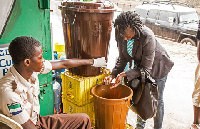Liberia, Nigeria declare state of emergency over Ebola
 |
| West African healthcare systems reel as Ebola toll hits 932 |
"The government and people of Liberia require extraordinary measures for the very survival of our state and for the protection of the lives of our people," Liberian President Ellen Johnson-Sirleaf said in an official statement. The state of emergency was for 90 days, effective on Wednesday.
Nigerian Health Minister Onyebuchi Chukwu said everyone in the world now was at risk, adding that the experience of Nigeria had opened the eyes of the world to the reality of Ebola.
The outbreak, by far the largest in the nearly 40-year history of the disease, has infected 1,711 people and killed 932 this year in Guinea, Liberia, Nigeria and Sierra Leone, according to the World Health Organization (WHO).
Meanwhile, the WHO is convening an emergency meeting in Geneva to determine if the outbreak amounts to a "public health emergency of international concern" and requires more of an international response.
The organization is also to gather medical ethics experts next week to discuss whether to apply untested and unproven treatments in a wider scope after a trial drug was given to two US charity workers infected in Liberia.
Nancy Writebol and Kent Brantly, who contracted the deadly disease while treating patients in Liberia, seemed to be improving after they were treated with an experimental drug called ZMapp.
US President Barack Obama expressed his caution Wednesday toward the application, saying it was "premature" to send the experimental drug to West Africa.
"I think we've got to let the science guide us. And you know, I don't think all the information is in on whether this drug is helpful," Obama told a press conference at the close of a three-day summit with dozens of African leaders.
"We're focusing on the public health approach right now," he added.
On the same day, the US government authorized the use of an Ebola diagnostic test to help contain the outbreak.
The test, called DoD EZ1 Real-time RT-PCR Assay, was developed by the Pentagon and designed for use on individuals who have symptoms of Ebola infection, who are at risk for exposure or who may have been exposed, according to the US Food and Drug Administration (FDA).
The diagnostic test was authorized for use on military personnel, aid workers and emergency responders in laboratories designated by the US Department of Defense, the FDA said.
Ebola, which spreads through body fluid or secretions such as faeces, urine, saliva and semen, can kill up to 90 percent of those infected. The fatality rate of the current epidemic is about 60 percent.





















